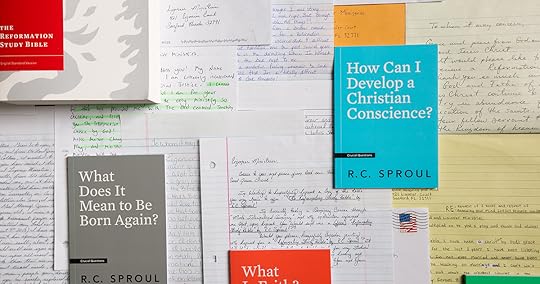R.C. Sproul's Blog, page 56
September 25, 2020
Inmates Need Your Help Now More Than Ever

The need is urgent to reach those within prison walls with the comfort and truth of God’s Word. Prison inmates, chaplains, and volunteers have been significantly impacted by the COVID-19 pandemic, and they are requesting resources from Ligonier to help them think biblically in this challenging season.
One inmate wrote in:
“Once again, I thank you for the marvelous tool of Tabletalk magazine, a matchless instrument for those who really want to learn the Word of God and, like me, have no church because of COVID-19. I’m spiritually hungry, and my source of the spiritual truths of Scripture is through Tabletalk, which you have been able to bless me with faithfully.”
Prisoners across the United States need your help now more than ever.
As a result of COVID-19, inmates are even more isolated than usual, leading to depression and suicidal tendencies.
Inmates are not allowed visits from family or volunteers.
Chaplains who work at facilities are limited in their contact with inmates, preventing adequate ministry opportunities.
Chapel services and Bibles studies are canceled or limited in size and frequency.
Thomas, a Correctional Officer in Kentucky, wrote:
“Many of our inmates have benefitted from and have changed their lives due to the local church and pastor volunteers that have come in the past to teach and worship with them. Our problem is that we need the resources for our library that all our inmates will have access to in the area of biblical knowledge and spiritual growth, especially during this time that the volunteers are not allowed to enter the prison complex.”
Every day, we receive dozens of letters like this one. Prisoners and chaplains are asking for help, but the need is greater than our current funding can serve. Without your support, many will struggle to access the resources they need to grow. But with your help, gospel ministry can flourish inside these facilities.
That’s why Ligonier launched the Truth for Inmates campaign to raise funds to supply theologically sound resources to inmates and the chaplains who minister to them across the country. Ligonier seeks to send resources to as many prisoners as possible in order to help them grow in Christ—even behind bars.
We are thrilled to announce that a generous Ligonier supporter has offered a seed gift of $25,000 to our Truth for Inmates four-day campaign. As we are looking to raise $80,000 in total, we ask that you consider joining in our efforts to raise an additional $55,000 to meet the needs of our prison outreach during this pandemic and into 2021. Will you help reach this goal?
Your gift will allow us to respond to the over 4,500 letters a year we receive from inmates. These letters result in over 3,500 Reformation Study Bibles, 800 free-of-charge subscriptions to Tabletalk, various other teaching resources, and theological correspondence. In addition to continuing this yearly resourcing, we are also working to produce paperback editions of La Biblia de Estudio de La Reforma for Spanish-speaking inmates.
Think of the impact your donation will have as these inmates study the truth of God’s Word and, by His grace, see their minds renewed and lives transformed. Indeed, this is the only comfort that will sustain them in this trying time.
Cody, an inmate in Texas, wrote to Ligonier Ministries after studying The Holiness of God by R.C. Sproul:
“Thank you so much for sending those copies of Dr. Sproul's book. Many men in here do not receive much of anything, and so such a free gift means a lot. And how much more since it spreads the Word of God! Thank you for your contributions, and thank you for not giving up on us; change by God is possible and is happening!”
You can help Cody and many others when you donate to the Truth for Inmates campaign this month. Please consider supporting this outreach. Together, we can fulfill the admonition to “remember those who are in prison, as though in prison with them” (Heb. 13:3). Thank you.


How Can I Love the Truth without Becoming a Pharisee?

The truth of God’s Word should not leave us unchanged. From one of our Ask Ligonier events, Stephen Nichols considers how we can be careful not to respond to the truth as the Pharisees did.
Get answers to your biblical and theological questions online as they arise at ask.Ligonier.org.
Read the Transcript


Rightly Regarding Our Sin

I have a high regard for the depravity of man. Without contest, the supreme sinfulness of sinners is the most disregarded reality — the world over. The fall of man is quite possibly the most forgotten, under appreciated, and misunderstood event in history. For this reason, many in our day preach “salvation” but neglect to preach sin; many talk about Christ but fail to talk about conviction; many offer testimonies about renewal but forget to mention repentance.
In our post postmodern society, you might get away with talking about Jesus with a Muslim; you might be able to have a great conversation with a Jewish friend about Christmas; you might be at liberty to say “God bless you” to an atheist; you may still even be able to pledge your allegiance to a nation “under God,” but don’t you dare mention a word about that awful, three-letter word sin. It is certainly true that sin, Satan, and spiritual death are among society’s dirty words, and you dare not speak them in polite company lest you incur the wrath of the most outspoken, self-appointed, religiously correct person present. To the gospel’s great misfortune, if it could know such misfortune, many in our churches have fallen prey to this sort of religiously correct philosophy of life. As a result, many have struggled to understand the good news without first knowing the bad news — and in the context of spiritual life and death, no news is most certainly bad news. Without the bad news about sin, Satan, and spiritual death, the good news is superfluous at best.
In my estimation, it is for this seemingly contradictory reason that so many Christians are spiritually depressed. In fact, such a designation is in itself a contradiction in terms — a “spiritually depressed Christian.” We get depressed on account of the fact that we have underestimated the power and reality of sin, and we have thus underestimated the power and reality of the gospel. The darkness of spiritual depression will not lift until we have sought forgiveness before the very face of God, coram Deo. For it is only when we rightly regard our sin that we will be able rightly to cling to the forgiveness, liberty, joy, and abundant life from the Light of the World.
This post was originally published in Tabletalk magazine.


September 24, 2020
$5 Friday (And More): Sanctification, Church, & Contentment

It’s time for our weekly $5 Friday sale. This week’s resources include such topics as sanctification, church, contentment, creation, Martin Luther, and more.
Plus, several bonus resources are also available for more than $5. These have been significantly discounted from their original price. This week’s bonus resources include:
The Heroic Boldness of Martin Luther by Steven Lawson, Audiobook $19 $12
Pleasing God with R.C. Sproul, CD $24 $10
Pleasing God with R.C. Sproul, Study Guide $12 $8
In Christ Alone: Living the Gospel-Centered Life by Sinclair Ferguson, Study Guide $18 $8
Sanctification: God’s Passion for His People by John MacArthur, Paperback $12 $8
Be Still, My Soul , Paperback $13 $8
Creation and Change by Douglas Kelly, Hardcover $30 $18
Morning and Evening by Charles Spurgeon, Hardcover $18 $12
Making a Difference by R.C. Sproul, Paperback $17 $12
Where in the World Is the Church? by Michael Horton, Paperback $23 $12
Light & Heat: A Passion for the Holiness of God: 2011 National Conference , DVD $75 $18
He Is Holy: 2019 National Conference , DVD $75 $18
Knowing Scripture with R.C. Sproul, DVD $48 $12
Knowing Scripture with R.C. Sproul, Study Guide $15 $5
A Survey of Church History, Part 1 A.D. 100-600 with W. Robert Godfrey, DVD $48 $15
A Survey of Church History, Part 1 A.D. 100-600 with W. Robert Godfrey, Study Guide $15 $8
God’s Technology with David Murray, DVD $15 $10
The Work of Christ by R.C. Sproul, Hardcover $15 $10
Contentment with Melissa Kruger, DVD $38 $15
Contentment with Melissa Kruger, Paperback $15 $5
The Hard Sayings of Jesus by R.C. Sproul, CD $17 $12
Biblical Metaphors for the Christian Life: June 2019 Tabletalk , Magazine $3 $1
Remembering God: December 2016 Tabletalk , Magazine $3 $1
Living by the Word: November 2018 Tabletalk , Magazine $3 $1
Why Should I Join a Church? by R.C. Sproul, Paperback $2 $1
Sale runs through 12:01 a.m.–11:59 p.m. Friday ET.
View today’s $5 Friday sale items.


A New Podcast—Luther: In Real Time

“Condemned. Reprobated. Rejected.” It’s 1520, and a monk by the name of Martin Luther has been declared a heretic by the most powerful man on earth. Luther is left with a choice: will he recant his teachings or stand alone for the truth?
Today, listen to the trailer for our newest podcast, Luther: In Real Time. Each episode is released 500 years to the day after the events described, allowing you to walk in Luther’s footsteps from his heresy charges to his famous stand for God’s Word.
The dramatic journey begins on October 10. Subscribe now to hear the trailer and to ensure that you receive each episode exactly 500 years after every twist and turn. Share this podcast with people of all ages so they can hear—in Luther’s own words—what Protestants are protesting and why it still matters today.
SUBSCRIBE TO HEAR THE TRAILER
Listen on Amazon Music, Apple Podcasts, Stitcher, or RSS, or by visiting LutherInRealTime.com. Coming soon on RefNet, Google Play, and TuneIn. You can also sign up to receive an email in your inbox each week as soon as a new episode of Luther: In Real Time is released.


Discipleship Together
Here’s an excerpt from Discipleship Together, Warren Peel's contribution to the September issue of Tabletalk:
I’m in the middle of reading The Body by Bill Bryson. It is both uplifting and tragic. Uplifting because every page is crammed full of detailed observations about just how fearfully and wonderfully made the human body is; tragic because Bryson, for all his rapturous marveling, cannot see the fingerprints of God on everything he is describing but instead attributes them to the blind “processes” of evolution.
Continue reading Discipleship Together, or begin receiving Tabletalk magazine by signing up for a free 3-month trial.
For a limited time, the new TabletalkMagazine.com allows everyone to browse and read the growing library of back issues, including this month’s issue.


September 23, 2020
Union with Christ: A New Teaching Series from Sinclair Ferguson

The Apostle Paul had no question about what it meant to be a Christian: he was “in Christ.” This simple phrase encapsulates the glorious benefits and blessings of the Christian life, and the importance of this expression is underscored by how regularly Paul used it. But many Christians today suffer from an identity crisis, unaware of this truth and how this new identity can reshape every aspect of their lives.
In this new video teaching series, Dr. Sinclair Ferguson explores the crucial meaning of our union with Christ, revealing that being a Christian is far more wonderful than many of us know.
This teaching series is available now for purchase on DVD or CD, as a digital download, or as a Ligonier Connect course. A corresponding study guide is also available.
Twelve 23-Minute Messages:
“In Christ”
Getting into Christ
Dimension of Our Union
Adam and Christ
A New Creation
Crucified with Christ
Baptized into Christ
Set Free from Sin
Hidden in Christ
Putting Off Sin, Putting On Christ
The Vine and the Branches
Sharing in His Death and Resurrection
Watch This Brief Clip from Dr. Ferguson:
Watch a Message from This Series for Free:
Purchase Options:
Purchase on DVD ($43.20)
Purchase on CD ($27.90)
Download audio and video ($21.60)
Purchase the corresponding study guide ($12.00)
Enroll on Ligonier Connect ($9.00/month)
Buy Now
Dr. Sinclair B. Ferguson is a Ligonier Ministries teaching fellow and Chancellor’s Professor of Systematic Theology at Reformed Theological Seminary. He previously served as senior minister of the First Presbyterian Church in Columbia, S.C., and he has written numerous books, including The Whole Christ, In Christ Alone, Devoted to God, Some Pastors and Teachers, In the Year of Our Lord, and Maturity.


The Consequences of Neglecting the Image of God
When a society removes God from its thinking, it strips away the framework for understanding human identity. In this clip from our live event Made in the Image of God, Sinclair Ferguson reveals why so many people in our culture don’t know who they are.
Transcript:
In my own view, this doctrine of the image of God has been one of the most neglected doctrines in the last hundred years of the Christian church and in the evangelical church. And in many ways, it is an explanation of our current political and social climate. If you think about the disintegration, the moral disintegration there has been in the Western world over the last twenty-five to fifty years. And people have often said to me, and I'm sure they've said this to you, "I can't believe how rapidly this has happened.” The fact that now you have to choose your identity; you have got to invent your identity if you're a young person. You're given a whole variety of possibilities, but you've got to invent who you are. And we no longer know what it means to be me. We no longer know who we are. We no longer know what it means to be a man or a woman, and it all seems to have happened so rapidly. But, you know, if you think about it, it’s happened very logically. Because, when a society removes God from the situation, it inevitably removes the truth about man from the situation. Because, when we remove God, we take away our identity: the image of God. And sadly, we no longer know who we are.


What If I Don’t Feel Forgiven?

There is an important difference between guilt and guilt feelings. The distinction is between that which is objective and that which is subjective. Guilt is objective; it is determined by a real analysis of what a person has done with respect to law. When a person transgresses a law, that person incurs guilt. This is true in the ultimate sense with regard to the law of God. Whenever we break the law of God, we incur objective guilt. We may deny that the guilt is there. We may seek to excuse it or deal with it in other ways. Still, the reality is that we have the guilt.
However, guilt feelings may or may not correspond proportionately to one’s objective guilt. In fact, in most cases, if not all cases, they do not correspond proportionately. As painful as guilt feelings can be—and we’ve all experienced the rigors of unsettling guilt feelings—I don’t think any of us have ever experienced feelings of guilt in direct proportion to the actual guilt that we bear before God. I believe it is one of the mercies of God that He protects us from having to feel the full weight of the guilt that we actually have incurred in His sight.
Just as there are objective and subjective aspects of guilt, so there are objective and subjective aspects of forgiveness. First of all, forgiveness itself is objective. The only cure for real guilt is real forgiveness based on real repentance and real faith. However, we may have real and true forgiveness before God and yet not feel forgiven. Likewise, we may feel forgiven when we are not forgiven. That makes the issue of forgiveness very sticky.
We tend to trust our feelings to tell us what state we are in before God. Someone recently told me about a friend of hers who lives her Christian life on the basis of experience. I think that’s a very dangerous thing, because it’s like saying, “I determine truth by my subjective responses and feelings to it.” I would much prefer that her friend tried to live the Christian life on the basis of Scripture, because Scripture is objective truth that transcends the immediacy of a person’s experience.
Ultimately, the only source of real forgiveness is God. Thankfully, God is quick to forgive. In fact, one of the few absolute promises that God makes to us is that, if we confess our sins to Him, He will most seriously and surely forgive those sins (1 John 1:9).
Many years ago, I went to see my pastor to tell him about a struggle I was having with guilt. After I told him my problem, he opened the Bible to 1 John 1:8 and asked me to read this verse out loud. It says, “If we say we have no sin, we deceive ourselves, and the truth is not in us.” In this verse, the apostle John is addressing the scenario we discussed earlier, in which a person who has real guilt attempts to deny or excuse it. John is saying that if we deny our guilt, we are simply fooling ourselves. We all sin. Therefore, we all contract guilt. If we refuse to accept that, we are engaged in perhaps the worst kind of deception, namely, self-deception. But when I read that passage, my pastor said to me: “That’s not your problem, because you’ve just told me why you came here. You came to tell me that you had a problem with sin.” Then he had me read the next verse: “If we confess our sins, he is faithful and just to forgive us our sins and to cleanse us from all unrighteousness.”
When I finished reading that, he asked me, “Have you confessed your sin?” I said: “Yes. But I still feel guilty.” He said: “OK. How about reading 1 John 1:9 for me.” I looked at him in confusion and said, “That’s what just I read.” He said: “I know. I want you to read it again.” So I picked up the Bible and I read, “If we confess our sins, he is faithful and just to forgive us our sins and to cleanse us from all unrighteousness.” Then I looked up at the minister, and he said, “So, what else?” I said: “Well, I’ve read this passage, I understand what it is saying, and I’ve confessed my sin. But I still feel guilty.” He said, “OK, this time I’d like you to read 1 John 1:9.” He made me read it again, and I ended up reading it five or six times. Finally, he got my attention. He said, “R. C., here’s what the truth of God declares: If ‘A,’ ‘B’ necessarily follows. God has promised that if you confess your sins, He will forgive you of your sins and cleanse you of your unrighteousness. You don’t believe that you’re forgiven because you don’t feel forgiven. What, then, are you trusting—your feelings or the truth of God?” I finally got the message he was trying to help me see.
This excerpt is adapted from What Can I Do with My Guilt? by R.C. Sproul. You can download all of R.C. Sproul's Crucial Questions booklets for free here.


September 22, 2020
A Conversation on Faithful Christian Ministry: September 22, 2020

Recently, our president and CEO, Chris Larson, hosted a panel discussion with three Ligonier Teaching Fellows: Drs. Sinclair Ferguson, Steven Lawson, and Derek Thomas. On September 22, we streamed this dialogue about our need as Christians to bear witness to the gospel with clarity and conviction in an age when confusion abounds.
This special event was streamed on Ligonier’s blog, YouTube, Facebook, and Twitter. You can also watch a recording of the discussion above.


R.C. Sproul's Blog
- R.C. Sproul's profile
- 1931 followers



